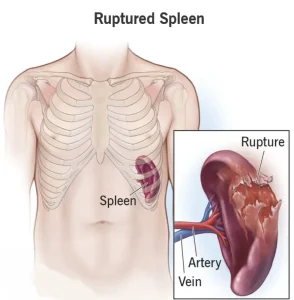Overview
A ruptured spleen is a serious medical emergency in which the spleen, an organ involved in filtering blood and supporting the immune system, tears or bursts. This condition often results from trauma, such as a car accident, sports injury, or fall. A ruptured spleen can cause internal bleeding, leading to life-threatening complications if not treated promptly.
Symptoms of Ruptured Spleen
Symptoms may appear immediately after injury or develop gradually depending on the severity of the rupture.
-
Sudden, severe pain in the upper left abdomen or left shoulder
-
Tenderness or swelling in the abdominal area
-
Dizziness or lightheadedness due to blood loss
-
Rapid heart rate and low blood pressure
-
Nausea or vomiting
-
Confusion or fainting in severe cases
Causes of Ruptured Spleen
A ruptured spleen typically occurs due to trauma or underlying medical conditions.
Common causes include:
-
Blunt abdominal trauma from accidents, falls, or sports injuries
-
Penetrating injuries, such as stab or gunshot wounds
-
Medical conditions that enlarge the spleen (splenomegaly), making it more vulnerable
-
Infections such as mononucleosis that increase spleen size
Risk Factors for Ruptured Spleen
Certain factors make the spleen more susceptible to rupture.
-
Participation in contact sports or high-risk activities
-
History of an enlarged spleen due to infection or disease
-
Trauma from accidents or falls
-
Blood disorders affecting spleen structure or function
Complications of Ruptured Spleen
A ruptured spleen can lead to life-threatening complications if not treated immediately.
-
Severe internal bleeding and hemorrhagic shock
-
Damage to surrounding organs
-
Infection or abscess formation
-
Requirement of surgical removal of the spleen (splenectomy), increasing susceptibility to infections
Prevention of Ruptured Spleen
While not all cases can be prevented, certain measures can reduce risk.
-
Use protective gear during sports or high-risk activities
-
Drive safely and use seat belts to minimize trauma risk
-
Prompt treatment of conditions that enlarge the spleen
-
Avoid contact sports if the spleen is enlarged or injured
Early recognition and immediate medical attention are crucial to prevent serious complications and improve survival in cases of ruptured spleen.
Advertisement

